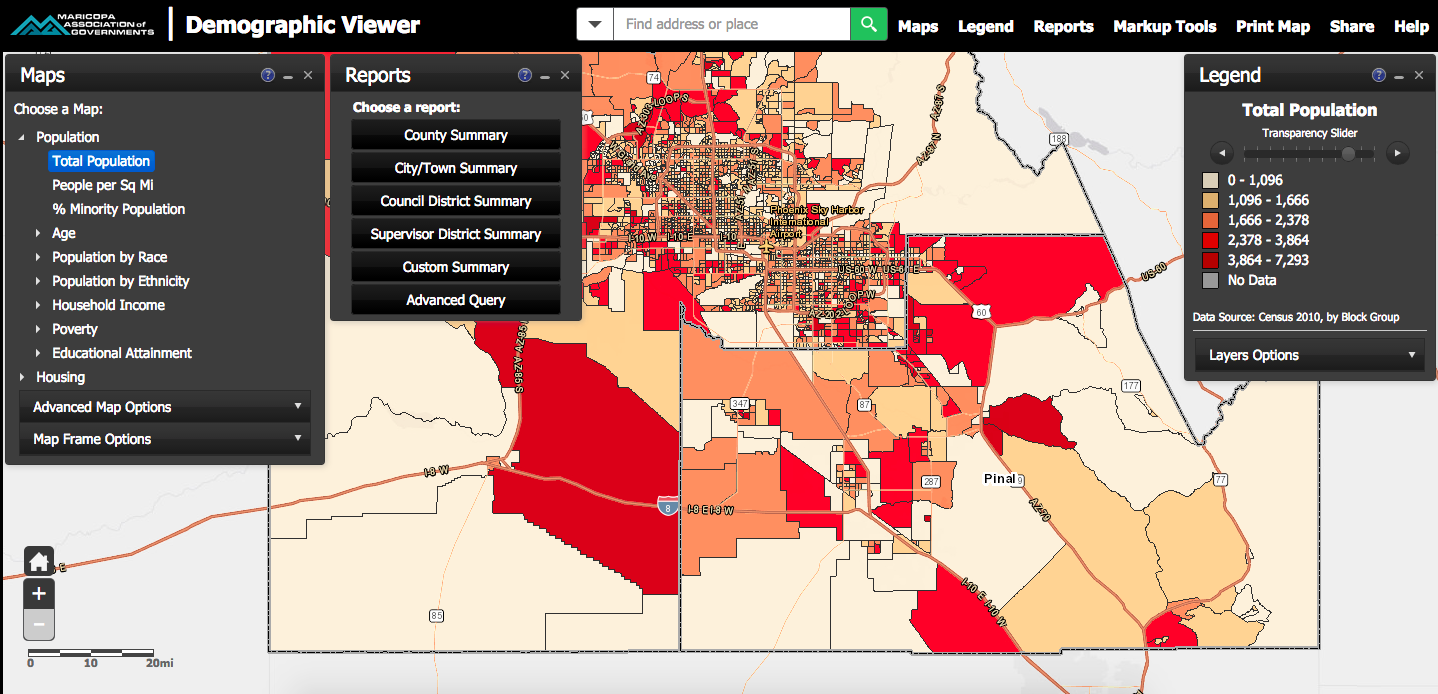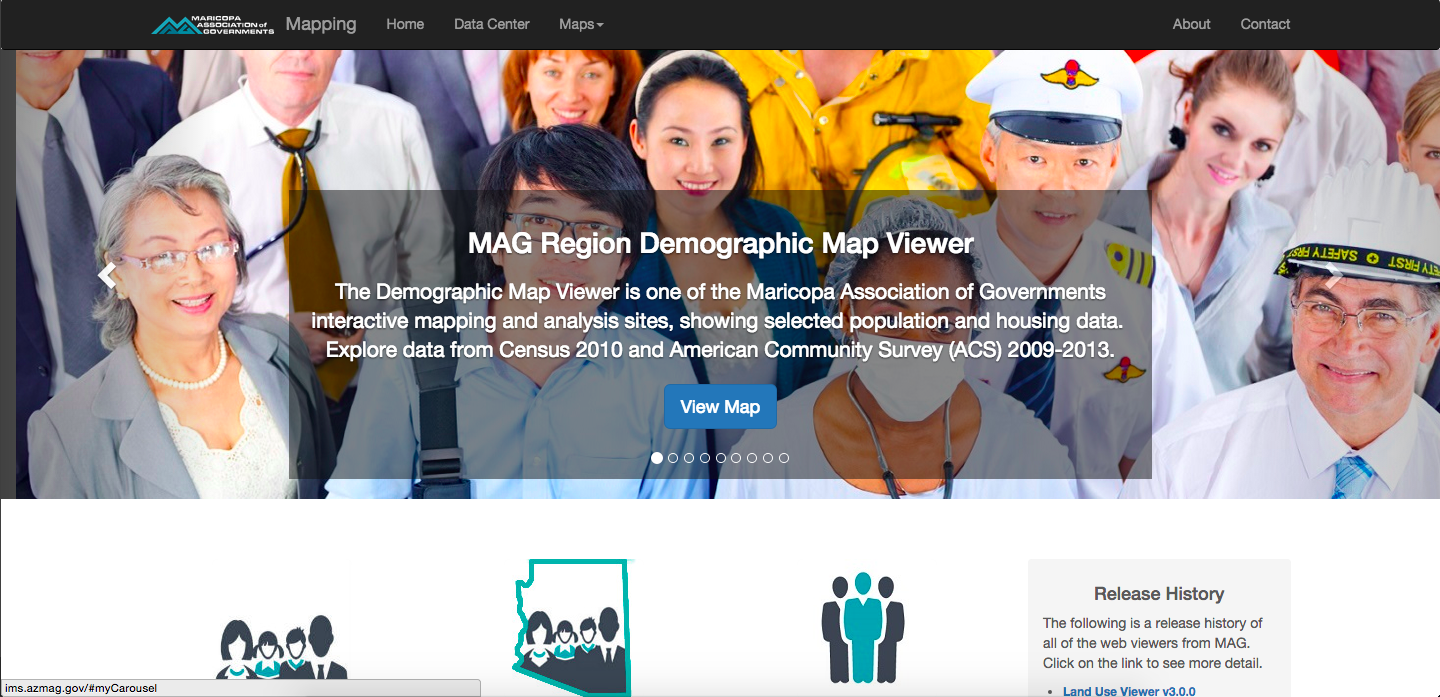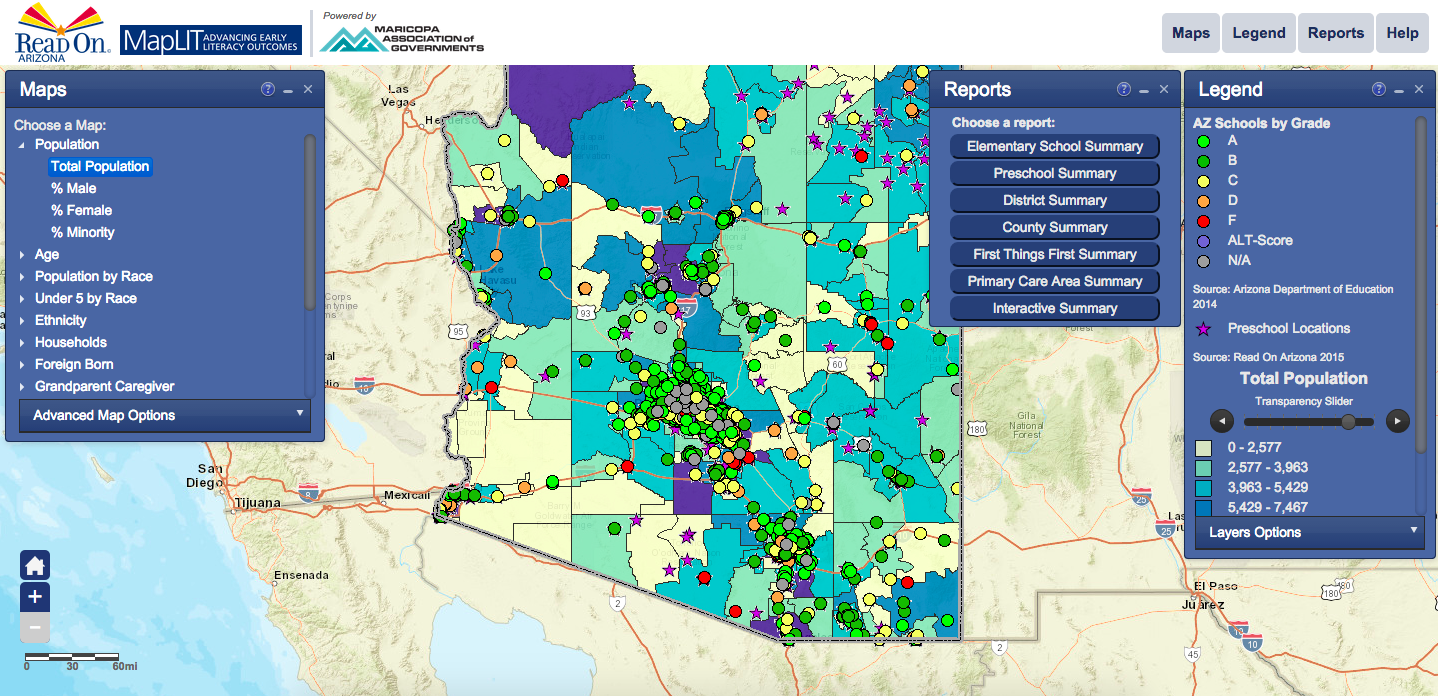Connecting state and local government leaders
Mapping technology used by the Maricopa Association of Governments is helping assure that third-grade students meet requirements for reading skills.
Using extensive datasets and sophisticated mapping tools, Arizona Literacy Director Terri Clark is making determined progress against her goal of making every third-grader proficient in reading.
It’s a big challenge in a state where 148,697 children five years of age and younger live in poverty—and where linguistic challenges, especially among Latinos, confront many others. The poverty rate for these young children is 28 percent in Arizona, only two points above the national average.
Coordinating a concerted attack on childhood illiteracy in the state is a nonprofit, quasi-governmental organization called Read On Arizona, which is run by Clark.

The story is one of targeting resources, and specific interventions, in schools and families where children are in danger of falling behind. Proficient reading in third grade is critical, Clark notes, because once children get to fourth grade, there is little or no time in the curriculum to teach them how to read.
Determining just where and when to make the interventions has involved a huge effort to assemble data on school districts, individual schools and individual families from disparate sources. Unveiled last August, Read On Arizona’s “MapLit” website has quickly become a national model that Clark’s colleagues demonstrate at conferences and to counterparts in other states.
The Power of Mapping
Using computers to help policy-makers visualize challenges they face is hardly a new phenomenon. In the national security field, for example, agencies have long used visual displays of information such as a community’s vulnerable infrastructure assets. Many have relied on IMapData, a pioneer in the field started some 30 years ago by William Lilley, a Yale history professor with a keen interest in government. The McLean, Virginia-based company is now called PlanetRisk Visionary Analytics.
In the state and local government sector, one of the most sophisticated efforts to use mapping technology is found at the Maricopa Association of Governments, which manages the regional planning and policy development in the greater Phoenix area. Maricopa is the nation’s fourth-largest county by population.
In an interview with Route Fifty, MAG Executive Director Dennis Smith observed that the boom-and-bust region, so reliant on housing and migration of snowbirds, was particularly hard hit by the recession that struck in 2008.
Just as the baseball managers in “Moneyball” had used big data to assemble their scrappy team, so, said Smith, MAG’s amassed data could be used “to revive economic development.”
MAG now has a first-class array of maps that display demographic data in the state and in the county down to the block level, employment data, land-use information, bicycle paths and the education data from Read On Arizona.

In a walk-through of the site—truly an impressive demonstration of years of work to assemble and display key information of use to regional and local planners, real estate developers and others—Information Services Director Anubhav Bagley showed Route Fifty how MAG has specific responsibility for transportation planning, and how the data can be used, for example, to determine commuting times and distances between homes and a large Intel research and development facility in the city of Chandler.
Every year, MAG and the county survey 500,000 people at businesses with 50 or more employees to determine where they live, how they get to work, how many minutes their commutes take, and whether they could or would use another mode of transit. “We find out what kind of workforce each city is attracting, their average age and all sorts of information on diverse workflows,” Bagley told me.
The information is useful not only to government planners, but also to local businesses, commercial real estate broker John Barnes said in an interview.
Barnes, who works for the global real estate firm Colliers International, cited the case of a small office building across the street from the large and rapidly expanding Banner-University Medical Center in Phoenix, whose value could better be assessed by close examination of residential and land use patterns in MAG’s databases.
Helping Young Children

To my eye, the most ambitious of the nine applications listed on the MAG interactive mapping page takes the viewer to the Read On Arizona website.
From her first day as Arizona’s literacy director, Terri Clark said that she began looking “for who had data on early literacy.” She sought not only information on how children were faring but also why some were falling behind.
Clark’s task was all the more urgent because a tough education standards law passed in 2010 was just taking effect. It made Arizona one of about 22 states with “retention” policies providing that third-graders who cannot pass reading tests must not be sent on to fourth grade.
The law seemed to indicate that large number might have to repeat third grade, since the latest National Assessment of Educational Progress reported that only 30 percent of Arizona fourth-grade students were proficient or better in reading.
To supplement Read on Arizona’s own data, Clark reached out to three other organizations for information that could explain literacy problems and their causes.
From the Arizona Department of Education she obtained third-grade reading scores for all pupils, and also records of chronic absenteeism—a key predictor of poor academic performance. Studies show, Clark said, that 18 or more days of absence in a year will hold children back, and she noted that the White House last month launched a national initiative to reduce truancy.
From another nonprofit, First Things First, came data from a biennial survey of educational needs—including data on how many books are found in households and how often a child benefits from having stories read or songs sung.
And the third key partner was the Arizona Department of Health Services, which could provide household-level data on problems including chronic asthma, pre-term births and other factors with direct links to literacy.
Since then, Read on Arizona has added dozens of other partners, including some that could provide early childhood, preschool information—"mapping the pipeline,” Clark said, of where the children are coming from as they enter the K-3 grades critical to gaining literacy.
About 18 months ago, all this data was residing in impenetrable spreadsheets.
“We needed to make it more accessible, more understandable to people,” Clark said. At a conference, she happened on a demonstration of MAG’s interactive mapping, and she asked if the MAG staff could help her in her quest.
The MapLIT Tool
The MAG staff agreed and today, the Read On Arizona’s MapLIT website displays an interactive mapping tool it describes as “a ‘one stop’ resource to identify key data sets (census, school, health, family engagement) that impact early literacy outcomes in communities...providing communities with graphic views of select data for all Arizona public/charter elementary school and preschool site locations.”
The mapping tool shows all Arizona schools color-coded as to how their literacy performance is ranked in the latest assessment by the Arizona Department of Education. Schools are assigned letter grades, from A to F. One can select a school and find out demographic characteristics including: minority share of students in kindergarten through third grade, students by race, age, ethnicity and whether grandparents are the caregivers.

Click on the Copper Rim Elementary School in Globe, 87 miles east of Phoenix in neighboring Gila County, and and one learns that it is a Title I school, with free and reduced-price lunches for 61 percent of students, with a chronic absentee rate of 9.7 percent and a third-grade proficiency rating of 66 percent in 2014.
Copper Rim, whose name evokes the industry that built the town, is a majority-minority school, the data show: 34 percent of its students are Latino, 22 percent are American Indian and 41 percent are white. The data show that 56 percent of Copper Rim’s students benefit from having a story read to them at least six days a week.
Copper Rim is shown as a red dot on the map, indicating an “F” in the state assessment. Schools are shown on the map as red, orange (a D rating), yellow (a C rating), dark green (a B rating) or bright green (an A rating). The mapping site offers such a wealth of information not only about elementary schools but also about various pre-school learning sites.
Meeting Higher Standards
A complicating factor in the literacy initiative has been adoption of new, tougher testing standards.
The Arizona State Board of Education in November 2014 voted to replace its old AIMS test —formally known as Arizona's Instrument to Measure Standards—with a new test called AzMERIT, or Arizona's Measurement of Educational Readiness to Inform Teaching.
Clark reported that the AIMS test showed that 76 percent of the state’s third-grade students were proficient or performing at grade level. But last spring, when the AzMerit test was first administered, the number dropped to 41 percent. The result didn’t come as much of a surprise to the state’s educators, who knew, said Clark, that the old test was masking substantial problems. “NAEP had been telling us the same thing,” she said.
Arizona’s new retention policy might suggest that many students would have to repeat third grade. But only 600 did so the first year, Clark said. This year, the number may rise a bit. It’s not higher because many interventions, including tutoring and summer school, are finding success. Thinking such interventions for a lot of students might be expensive, I asked how they were funded. The answer is that when the Arizona legislature passed the new retention policy, it also earmarked $40 million a year toward programs to bring young students up to par. So far, the literacy funding has not been appreciably reduced in Arizona’s budget wars.
The impressive data displays found in the MapLIT program identify where and when help is needed in the critical years that can propel a successful life. “It takes eight years to build a reader,” Clark said.
Timothy B. Clark is Editor-at-Large at Government Executive’s Route Fifty.

NEXT STORY: The Money in Recycling Has Vanished; What Do States, Cities Do Now?




